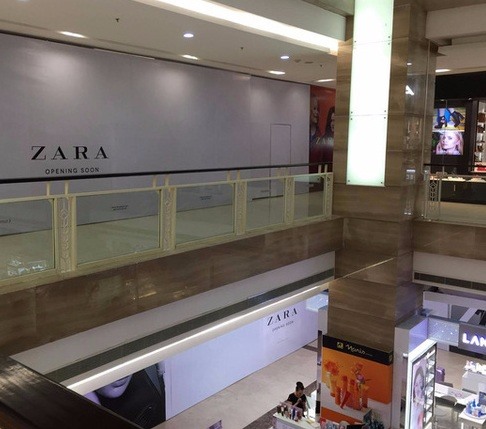 bizhub
bizhub

Global fashion brands Zara and H&M are gearing up to open their stores in Hà Nội in November, months after launching their first stores in HCM City.
 |
| The board showing Zara opening soon at Vincom Bà Triệu, Hà Nội. — File Photo |
HÀ NỘI — Global fashion brands Zara and H&M are gearing up to open their stores in Hà Nội in November, months after launching their first stores in HCM City.
H&M on Monday morning announced on its Facebook fanpage for Vietnamese that its first store in Hà Nội will open at Vincom Royal City, Thanh Xuân District, at 10.30am on November 11.
Its first store in Việt Nam opened at Vincom Đồng Khởi, HCM City’s District 1, on September 1.
H&M is currently present in 68 markets worldwide with a total store count globally of more than 4,130. Việt Nam is the fourth market of the Swedish fashion retailer in Southeast Asia.
Besides opening physical stores, H&M is expanding online and targets to open eight new H&M online markets this year, which means online shopping will be available in 43 markets by the end of this year. The company plans that in the future online shopping will be available in all store markets as well as other markets.
Its largest global rival, Zara, last week also disclosed information about the opening of its store in Hà Nội in November at Vincom Bà Triệu.
This is Zara’s second store in Việt Nam, with the first one opened in September 2016, at Vimcom Đồng Khởi in HCM City.
Zara’s online shopping service for the Việt Nam market has been available since April 5.
Zara, a brand of Spanish fashion retailer Inditex which also owns Pull&Bear, Massimo Dutti and Bershka, currently has more than 2,090 stores globally.
Property services firm Savills Việt Nam said with an average growth rate of 15 per cent, the fast fashion market would be the fastest-growing segment of Việt Nam’s retail market in the coming year.
The company estimated that some 200 foreign fast fashion brands are currently present in the country with huge retail potential, and more brands were expected in the future, such as Uniqlo and Forever 21.
According to the Việt Nam Institute for Trade, the country’s retail industry will grow on average at 11.9 per cent per year to reach a US$179 billion market by 2020 from $102 billion market in 2015. — VNS




